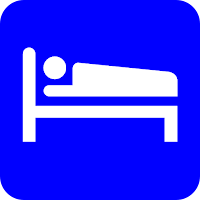Sleeping and
Mesothelioma

Those who have cancer
may suffer from multiple sleeping problems because of their condition, their
prescribed medications, and their treatments, but this puts them in a tough
situation. Getting a good night's sleep helps fight cancer, so those diagnosed
with mesothelioma can benefit from getting the rest that is
necessary for their body. Here are some of the common sleep problems associated
with cancer and information on how increased sleep can benefit patients.
Hypersomnia
Hypersomnia, or excessive drowsiness during the daytime, is a common side
effect of cancer and/or its treatment. Even cancer patients who sleep for eight
to ten hours at night, may still fall asleep during the day. Regardless of the
amount of sleep a patient gets, he or she will never feel relief even after
sleeping at night or taking naps. Many confuse fatigue with hypersomnia, but
they are two different things. Hypersomnia is a lack of sleep while fatigue is
a lack of energy.
Insomnia
Cancer itself does not cause insomnia, but many of the symptoms do, as well as
side effects from treatment and medication. Some examples of symptoms that
cause insomnia include:
- chronic
pain
- breathing
difficulty
- chronic
coughing
- feelings
about living with cancer including fear, anxiety, and grief
Nightmares
Many cancer patients report experiencing vivid nightmares once their treatment
starts. This may be caused by treatment and medications, but also may be driven
by fears about having cancer. Regardless, when cancer patients fear falling
asleep, it creates an unhealthy cycle of exhaustion where the patient is trying
to catch up on sleep during the day because of scary nights.
How does sleep fight cancer?
Sleeping well is important for one's overall health;
when a person doesn't get enough sleep they are at higher risk for obesity,
diabetes, depression, cardiovascular issues, and cancer. In a recent study, researchers found
lack of sleep increases the risk of cancer recurrence. Sleep specifically
affects cancer through the immune system. When one doesn't get enough sleep, it
weakens their immune system which allows cancer to spread and tumors to grow
more aggressively.
How can cancer patients ensure that they are getting enough rest?
Sleep issues associated with cancer come from different sources, so cancer
patients need to speak openly and honestly about their struggles with their
doctor. Doctors can prescribe medications that may help with sleep, especially
in the cases of hypersomnia and insomnia, but if the sleep deprivation is
induced by fear or anxiety, patients may need to seek counseling with a
therapist. Attending support groups with other patients may also alleviate
anxiety and fear about cancer that disrupts sleep. Other tips that may help
include turning off electronics at least an hour before bedtime. Learning and
practicing meditation and associated deep breathing exercises may also help
with sleep. Reading a book for a short time before sleeping may serve to reduce
fear and anxiety, so one can fall asleep easier. Regardless, not getting the
proper amount of sleep is a serious health issue for those who are at risk for
cancer, those who are undergoing chemotherapy, radiation, and other treatments,
and those who are in remission from their cancer.
************************************
Contributed by Anonymous Author(s)
*************************************
Disclaimer - Article is for information only and is not medical advice.
